Mosquito bombing starts tomorrow
The Rhode Island Department of Environmental Management (DEM) is announcing that a licensed contractor, North Fork Helicopters, will conduct an aerial application of mosquito larvicide across 3,000 acres of Chapman Swamp in Westerly and Great Swamp in South Kingstown beginning Thursday, Aug. 29 through Friday, Aug. 30, weather permitting.
The application, which consists of pellets that kill mosquito larvae being dropped by a helicopter into the targeted wetlands, will take place between 7 AM and 7 PM. The larvicide applications will not target open bodies of water, and treatment areas do not include Worden Pond in South Kingstown or Chapman Pond in Westerly. In the event of inclement weather, a rain date will be announced. The larvicide used, known as Bti, does not pose a risk to humans or the environment.
Larviciding is recommended as part of the state's action plan to control West Nile Virus (WNV) and Eastern Equine Encephalitis (EEE) Virus and is considered an effective strategy to reduce mosquito populations and related disease risk. In the most recent weekly RI Mosquito Report state officials reaffirmed that the high amount of EEE virus activity in Washington County indicates a significant risk in the area and an elevated risk level throughout Rhode Island.
Bti, a naturally occurring bacterium applied in granular form to control mosquito breeding in swamps and other breeding habitats. It is applied to standing water where developing larvae are found. Bti is an environmentally friendly product whose toxins specifically affect the larvae of only mosquitoes, black flies, and fungus gnats and do not pose a risk to human health.
These toxins do not affect other types of insects
including honeybees. It is approved for pest control in organic farming operations.
Aerial application of larvicide is one of the most effective tools to reduce
the number of biting mosquitoes by preventing the larval stage from maturing
into adults. The Town of Westerly conducted an aerial application of Bti on Chapman
Swamp in April, as part of an annual application conducted by the
Town since 1997 to help control mosquito breeding, given the area’s remote
location and large footprint.
During the application period, all DEM access points within
Great Swamp Management Area will be closed and DEM recommends avoiding the
area. The Great Swamp Shooting Range (GSSR) will
be closed on Thursday, Aug. 29, and Friday, Aug. 30, with normal operations
resuming on Saturday, Aug. 31. The town of South Kingstown will close a portion
of the William C. O’Neill (South County) Bike Path which runs through the
treatment area, from Ministerial Road to the Kingston Train Station, during the
application period.
Last week, DEM, the Rhode Island Department of Health
(RIDOH) and the Mosquito Borne Disease Advisory Group (MDAG) recommended that schools, organizations, and
communities consider “smart scheduling” of outdoor activities
scheduled during early morning or dusk hours be rescheduled to earlier in the
afternoon or relocated to an indoor venue. The “smart scheduling” of events is
intended to help minimize the risk of mosquito bites for players, coaches, and
spectators.
Personal protection is the first line of defense against
mosquitoes that may carry diseases and the most effective way to avoid
infection. Rhode Islanders should take the following measures to protect
themselves from mosquito bites:
- Put
screens on windows and doors. Fix screens that are loose or have holes.
- Consider
rescheduling outdoor activities that occur during the evening or early
morning at sunrise and sundown (when mosquitoes carrying the EEE virus are
most active). If you must be outside, wear long-sleeved shirts and pants
and use bug spray.
- Use EPA-approved bug spray with
one of the following active ingredients: DEET (20-30% strength),
picaridin, IR3535, and oil of lemon eucalyptus or paramenthane. Always
read the label and follow all directions and precautions.
- Do not
use bug spray with DEET on infants under two months of age. Check the
product label to find the concentration of DEET in a product. The American
Academy of Pediatrics recommends that repellents contain no more than 30%
DEET when used on children. Children should be careful not to rub their
eyes after bug spray has been applied on their skin. Wash children’s hands
with soap and water to remove any bug spray when they return indoors.
- Put
mosquito netting over playpens and baby carriages.
For additional mosquito prevention tips, videos, and local
data from RIDOH, visit health.ri.gov/mosquito.
For more information on DEM programs and initiatives,
visit www.dem.ri.gov. Follow DEM on Facebook, Twitter (@RhodeIslandDEM),
or Instagram (@rhodeisland.dem) for timely updates. Sign up here to receive the latest
press releases, news, and events from DEM's Public Affairs Office to your
inbox.
